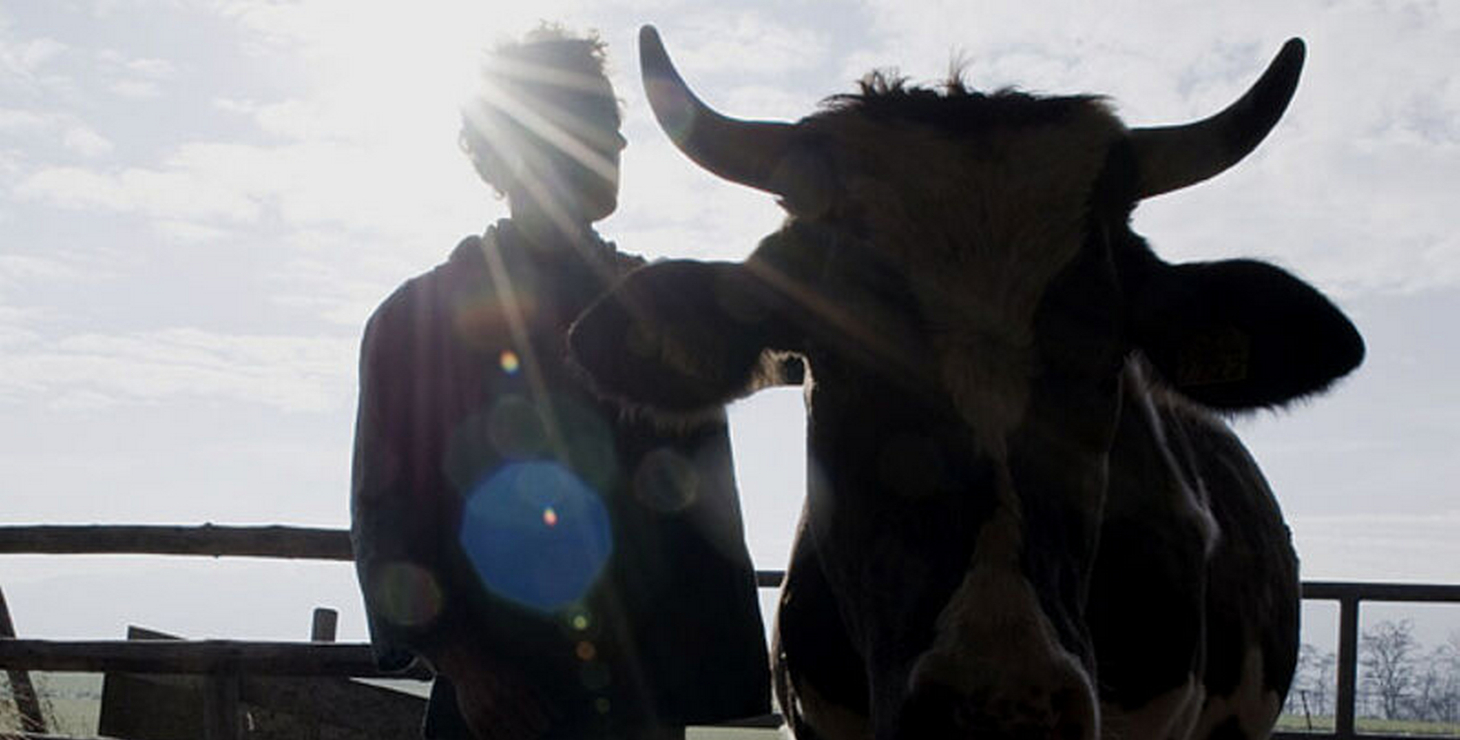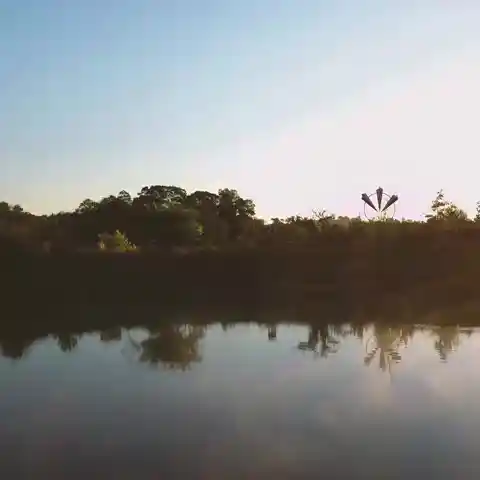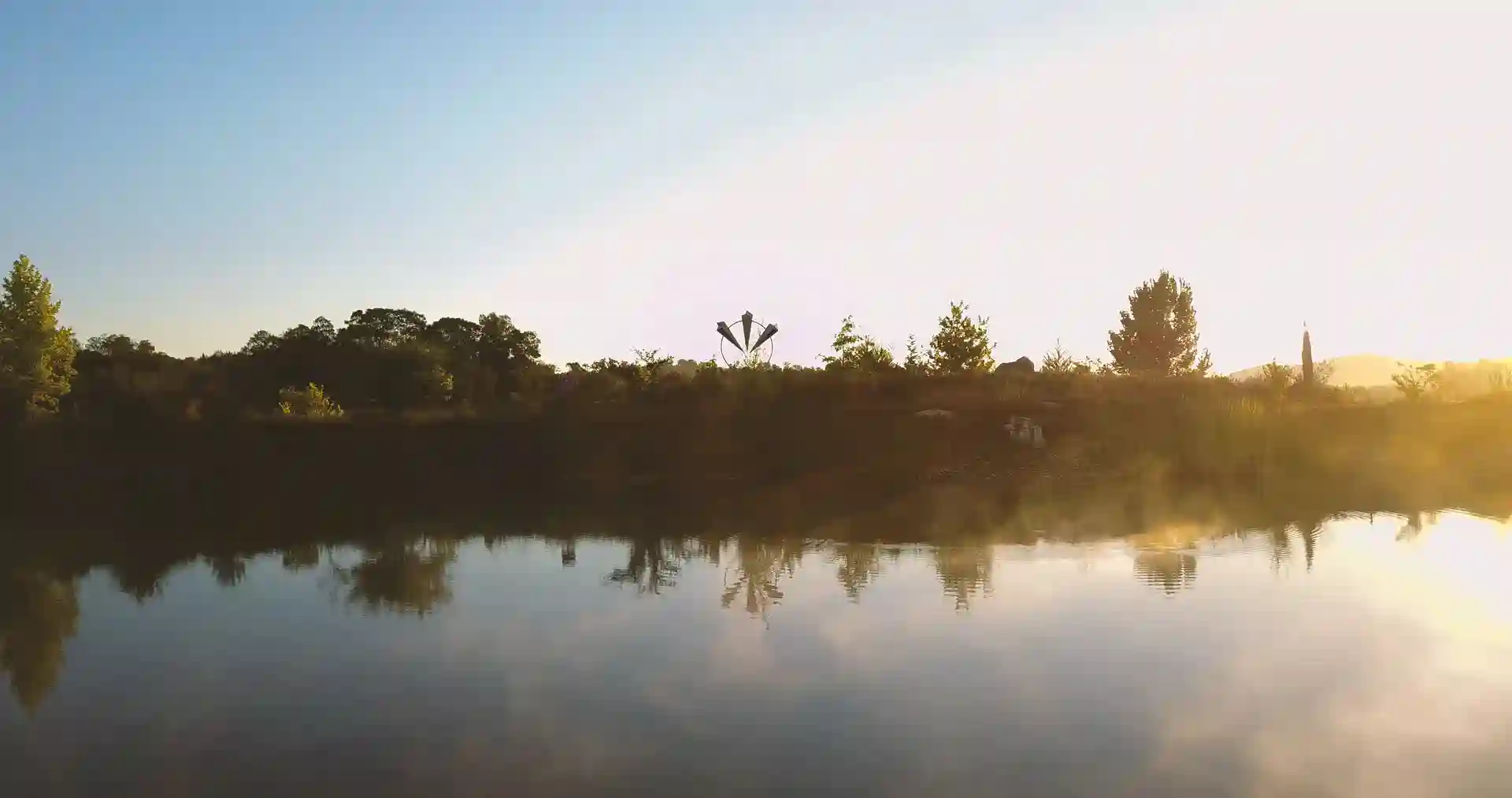Compassion in Action – Turning the Port of Sines into a Site for Sacred Activism for the Animals
Members of the course “Cooperation with Animals”, held each year in Tamera, took action to help document the loading of animals to ships. This is the start of an unbearable journey for those sentient beings overseas where there is no help from law or vets.
The group from Tamera, which included people from nine different countries, helped PATAV (Plataforma Anti-Transporte de Animais Vivos) with their filming, turning the port of Sines into a site for sacred activism.
It was a big lesson in opening the heart and compassion in sacred action. Eike Braunroths advice: „Feel the feelings that the animals have, feel them deeply – and do not let yourself be washed away into your own suffering. Stay with the animals. When you come home in the evening, come home with your head up and with a light soul!“
by Beatrice Carmi, Anouchka Grose and Dr. Tanja Kaller, 14/5/2024

The media often focus their attention on the treatment of animals born and bred into intensive farming, but little attention is given to their transport overseas. Across the world, numerous ships are loaded daily to take live animals to be slaughtered, especially in the Middle East. Some routes depart from as far away as Brazil or Australia, the journeys lasting weeks or even months. Animals on board endure extremely difficult living conditions, although not much is known about the exact details as the information is hard to uncover. Still, the little we know is disturbing.
Exported animals — mostly cows, bulls and sheep — arrive in states of exhaustion and dehydration due to the inhospitable conditions on board. Livestock ships are crowded, so it is difficult for the animals to reach food and water, and for the crew to remove the animals’ waste. This means they are surrounded by their own excrement, sometimes for weeks on end, leading to disease and death. There are often no vets or welfare officers on board and the inevitable loss of a certain percentage of animals during the voyage is treated as unavoidable collateral damage.
As if that weren’t enough, the geopolitical situation can exacerbate what already seems a terrible situation. In 2022, the Al Badri 1 ship capsized in the Red Sea losing 15,000 of its cargo of sheep (since then, New Zealand has banned all export of livestock by sea, and Germany has greatly tightened its regulations), while earlier this year, crossings were made worse by the presence of Houthi militias, resulting in a ship containing 16,000 sheep and cattle being returned to Australia, a round trip that took over five weeks. Experimental trips have also been made around Africa to avoid crossing the Red Sea, resulting in five-week-long voyages.
On the 23rd April 2024, a ship named Gulf Livestock II left Sines, Portugal, bound for Israel, with around 5000 young bulls on board. Loading took place across two days, and this was after the animals had already travelled across Portugal in crowded, three-storey cattle trucks.
If the name of the ship sounds familiar, it may be due to its predecessor, Gulf Livestock I, making global headlines in 2020 after sinking off the coast of Japan, drowning all 5867 of the cattle on board plus forty-one of its forty-three crew members.
Members of the Cooperation with Animals course, held each year in the community of Tamera, were informed of the practice and joined PATAV – Plataforma Anti-Transporte de Animais Vivos, a small collective who make it their duty to film the shipments with the hope of raising awareness and to alert people to the acts of barbarism being committed right under their noses.
The group from Tamera, which included people from nine different countries, helped PATAV with their filming, turning the port of Sines into a site for sacred activism. The activists supported the animals from two different locations. While one group stood at the entrance of the port to be as near as possible to the entering trucks, the other gathered across the bay where loading could be caught on camera. A third group remained in Tamera to anchor the action from the community itself. Sabine Lichtenfels, one of Tamera‘s founders, held the space for the action.
Together, all three groups chanted, letting the animals know that their suffering was being witnessed and not ignored. Support was also sent to the workers. From farm labourers to drivers and abattoir workers, thousands suffer from the severe mental health impact of witnessing first-hand and engaging in such brutal working conditions, often turning to drugs, alcohol and violence. Many are migrant workers who have little choice in their employment.
It was a big lesson in opening the heart and compassion in sacred action. As preparation we asked Eike Braunroth, one of the teachers in the course and an expert in cooperation with animals, what, in his opinion, is helpful for the animals in this situation. His answer was in short: Feel the feelings that the animals have, feel them deeply – and do not let yourself be washed away into your own suffering. Stay with the animals. When you come home in the evening, come home with your head up and with a light soul! Thank you for this profound answer in learning about compassion. An intense action with intense learnings about connecting with what is happening on our planet – with animals, with humans, with earth.
On May 4th, almost two weeks after loading, the ship arrived at Haifa harbour and began to unload, in spite of 86% of Israel’s population supporting a ban on the cruel trade in international livestock (Israel Against Live Shipments). Footage captured by animal rights activists at both ports show the animals being hit and prodded if they move too slowly on their reluctant journey to slaughter.
Why does this inhumane practice take place at all? The reasons are complex. The one often put forward is that kosher and halal meat production require that the animal is conscious at the moment of slaughter, whereas mainstream European meat production involves electronic stunning of the animal to reduce distress. Recent legal reviews to EU regulations around animal welfare have granted European countries the right to forbid the commercial slaughter of animals without stunning. However, both Muslim and Jewish religious leaders have spoken out against the long distance transport of livestock. For instance in 2018, sixty rabbis signed a letter stating that such extreme cruelty to animals was not in keeping with sacred teachings.
The secular reason for the continued practice is, perhaps unsurprisingly, economic. European farming subsidies make it profitable to remove male calves from the dairy system, raise them in Europe, ship them to the Middle East (where the huge amount of water involved in animal-rearing is an obstacle) then fatten them for slaughter on arrival — and sometimes then ship them back to Europe as frozen or refrigerated meat.
Micro-specialisations in farming mean animals are moved from location to location, perhaps being born in Ireland before being shipped to Spain for rearing and then on to other continents for fattening and slaughter. Not only is this a problem for the animals themselves, but also for the environment, with feed being grown in one location, then transported to another, not to mention the creation of monocultures and all the problems this can cause for local wildlife.
The tide is already beginning to turn in the animals’ favour but there is still much work to be done. Residents of Sines can get involved by contacting PATAV and finding out about other similar actions. People from further afield can sign the petition to raise the subject in Portuguese parliament or the Israeli petition to bring this cruel practice to an end.
To close, some words to the bigger context:
“As long as there are slaughter houses there always will be battlefields.” (Leo Tolstoi)
What humans do to animals, they sooner or later will also do to humans. When we see horror done to animals we need to ask: What is the horror that the human being is going through, what is at the root of the pain? Where is the turning point from repression and indifference to compassion and an open heart? It lies within us, and within the society that we are part of. Our current so called peace society exists with the economic support of the weapon-industry – to make the change, it is essential to make a shift from a mindset that is rooted in separation, exploitation and war into a consciousness and lifestyle that is rooted in the equality and unity of all life. Our baseline attitude towards life is the anchor point for a fundamental change of society and its values. What is peace really about? What kind of world do we want to live in? Imagine a world in which we are in contact with each other and animals again, interested in each others’ needs and acting from place of cooperation – a world in which no one needs to fear another. It may sound like an utopia, however it is possible and up to us to embark on this journey of the heart.
Contacts:
Animal group in Tamera: animals(at)tamera.org
PATAV – Plataforma Anti-Transporte de Animais Vivos: info.patav(at)gmail.com
Israel Against Live Shipment: contact(at)shiptohell.org

